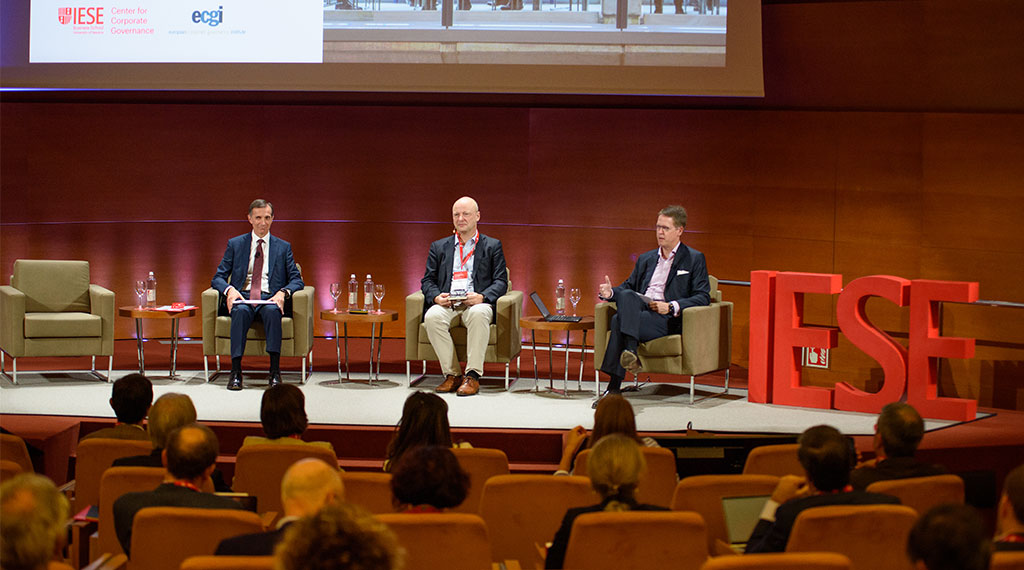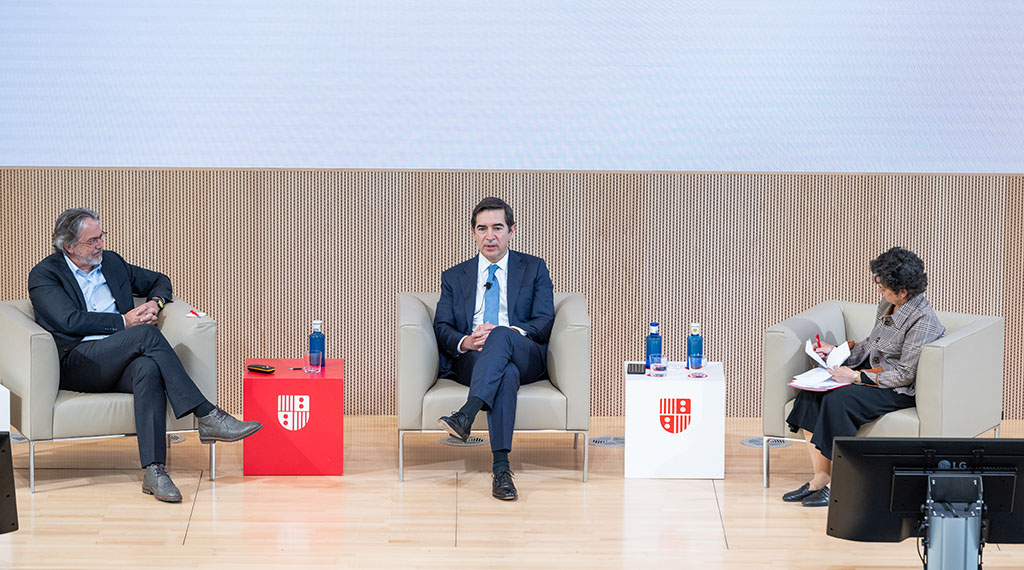Stories
How corporate boards shape company culture
Corporate governance conference examines ways those at the top create organization-wide culture
IESE’s Jordi Canals, Marco Becht of the European Corporate Governance Institute, and IESE Dean Franz Heukamp open the 4th annual IESE-ECGI Corporate Governance Conference.
Photo: Edu Ferrer
October 4, 2022

How do boards of directors shape corporate culture? What role do factors such as executive compensation, diversity and team cohesion play in creating corporate culture? And what impact does culture ultimately have on firm performance?
These were some of the questions explored in the 2022 Corporate Governance Conference, organized by the IESE Center for Corporate Governance and the European Corporate Governance Institute. The theme of this year’s conference, held on IESE’s Barcelona campus and online, was Corporate Governance, Corporate Culture and the Board’s Culture.
Whatever the answer to those questions, corporate culture is more important than ever to the success of firms, particularly in a post-pandemic time when employees around the world are rethinking why and how they work. Shareholder primacy is being contested. And boards – once exclusive clubs that rubberstamped most decisions – must play a decisive role in creating cultures that attract and retain talent and foster long-term decision-making.
“Movements that have been unfolding over the past few years make the current time a turning point for corporate culture,” said Prof. Jordi Canals, president of the IESE Center for Corporate Governance.
Recent crises in companies ranging from Facebook to Uber have illustrated the perils of shaky corporate culture. “Certainly those crises had many factors, but it’s clear that corporate culture was one of them,” Canals noted. Without a solid corporate culture, things can go wrong very quickly.
While the conference focused on a wide spectrum of issues related to corporate culture, some of the takeaways included:
- Culture is tricky to define. “Culture is one of the most complicated words in the English language,” said MIT Prof. Robert Gibbons. It’s related to values and norms, attitudes and behaviors. And yet while definitions may vary, executives who spoke at the conference had few doubts about what it meant to them. “Culture is values in action,” said Helena Herrero, president of HP Southern Europe. “It’s how officially and unofficially we take decisions and do things.”
- Culture casts a wide net. How do companies create their own unique culture? It goes beyond policies and into leadership, and encompasses areas such as executive compensation. In re-examining empirical research on the determinants of executive pay, Alex Edmans of London Business School found aspects more linked to culture – such as intrinsic motivation, personal reputation and fairness considerations – are more important to executives than purely financial incentives.
- Board composition matters. Board diversity – not just in gender and ethnicity but also in terms of educational background and age – translates into more diverse organizations. “Board diversity is linked to gains in representation at all levels of the organization,” said Jillian Grennan of Santa Clara University. For Ermenegildo Zegna, chairman and CEO of Zegna, diversity also meant bringing in independent board members to balance the presence of family in his family-owned company.
- Boards must be cohesive teams too. If boards are composed of big egos acting on their own, they’ll fail to have organization-wide impact. Paul Healy of Harvard Business School explored the internal operations of boards – or how boards operated as a team. His research found internal board operations are linked to board effectiveness, which is in turn associated with firm outcomes.
- Culture matters over the long term. Rodolphe Durand of HEC Paris argued that corporate culture must be oriented toward a purpose that takes into account many stakeholders. That orientation is increasingly valued by owners and investors, who will then pressure boards to take a longer-term view of the firm. At a company such as Ikea, that translates into a well-embedded culture of building financial resilience to be able to take long-term decisions. “At the end of the day culture is in the hands of the leadership,” said Juvencio Maeztu, deputy CEO of Ingka Ikea. “Leading by example is what brings the culture alive.”
Juan Pujadas is a board member of Wells Fargo, the U.S. financial services that became notorious for its high-pressure sales culture that pressured employees into valuing short-term profit even at the expense of defrauding customers. The board has spent recent years undoing all that, replacing executives and rewriting the culture playbook, Pujadas said. “It’s hard work and takes time and is in everything that you do,” he said.


